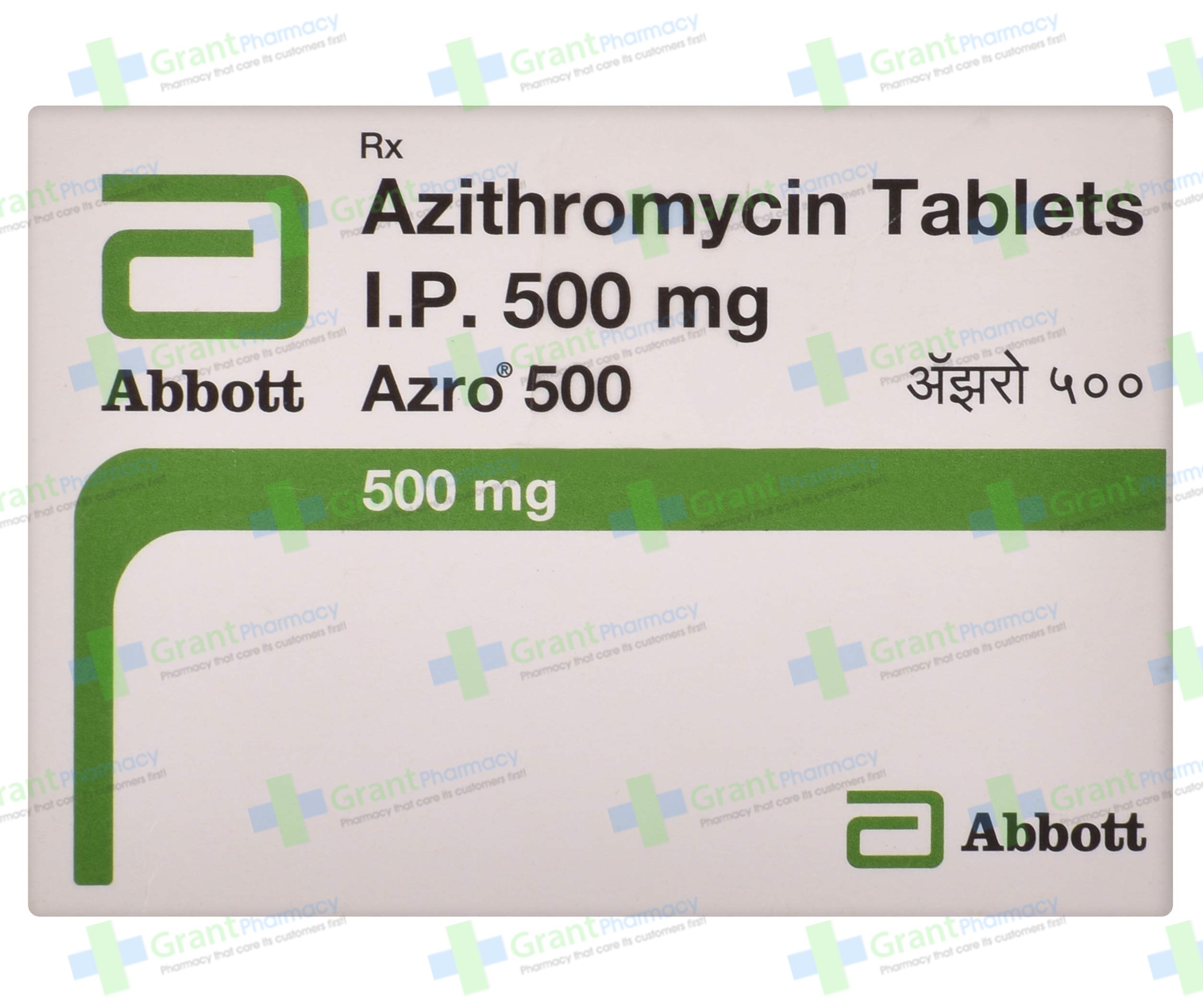






Zithromax (Azithromycin) is an antibiotic medication. It is prescribed to treat many infections in adults and children such as pneumonia, sinus infection, and strep throat. It is a prescription medication, available with a valid prescription.
Azithromycin is the generic name (Azithromycin dihydrate and Azithromycin monohydrate) and it comes as different brand name drugs such as Zithromax, Zmax, and Zithromax Z-Pak. It belongs to the macrolide antibiotic class of drugs. Azithromycin comes in the form of a tablet, liquid, and injection that is administered into blood vessels.
Azithromycin is commonly used to treat certain bacterial infections such as
Lung infections (pneumonia, bronchitis)
Throat infections (tonsillitis, pharyngitis)
Skin infections (cellulitis)
Sinus infections
Ear infections in children
Certain sexually transmitted infections
Pelvic inflammatory diseases in females
Genital ulcer disease
Certain infections in HIV/AIDS patients
In children, Zithromax can treat certain ear infections (6 months and older), pneumonia (6 months and older), strep throat (3 years and above), and tonsil infections (2 years and above).
Zithromax is also prescribed to control the sudden worsening of chronic obstructive pulmonary diseases because of a bacterial infection. Bacteria in certain locations may become resistant to Azithromycin, making it less effective. This medicine can also be used for other infections determined by a healthcare professional.
Azithromycin prevents certain bacteria from producing the proteins inside their cells, they necessitate to grow and replicate. As a result, bacteria become unable to grow, spread, and even survive sometimes.

At GrantPharmacy Zithromax is available in different dosage forms such as 200 mg, 500 mg, and 600 mg oral tablets; 100 mg, 200 mg, and 1 g oral suspension and 2 g extended-release oral suspension.
Pneumonia, strep throat, tonsils, skin infections, and chronic obstructive pulmonary disease: Zithromax 500 mg orally on day 1 and 250 mg daily from day 2 to 5.
Obstructive pulmonary disease and sinus infections: Azithromycin 500 mg orally daily for 3 days.
Infections of the cervix and urethra: 1 to 2 grams (based on the infection) orally as a single dose.
For children, the exact dosage depends on their body weight.
Ear infection: 30 mg/kg orally as a single dose or 10 mg/kg orally once a day for 3 days or 10 mg/kg orally on day 1 and 5 mg/kg once a day from day 2 to 5.
Pneumonia: 10 mg/kg orally on the 1st day and 5 mg/kg once a day from the 2nd till the 5th day.
Sinus infections: 10 mg/kg orally once a day for 3 days.
Tonsillitis and strep throat: 12 mg/kg orally once a day for 5 days.
Do not use this medicine if you ever had an allergic reaction to Azithromycin, Zmax, Z-Pak, Zithromax, Erythromycin, any other macrolide antibiotic medicine, or any other ingredient of this medication.
Your doctor should be aware if you are taking any prescription or non-prescription medicines, herbal products, vitamins, or any other supplements. It will help your healthcare provider determine if Zithromax tablets are right for you.
Tell your doctor if you ever have kidney problems, cystic fibrosis, hypokalemia (low blood potassium), or hypomagnesemia (low blood magnesium).
Azithromycin may not be suitable for you if have liver disease or your liver is not functioning well. If you have liver problems you may need to do tests to determine if your liver is functioning well during the treatment.
Inform your doctor if you have heart problems (QT prolongation or long QT syndrome that influences the heart rhythm) or if anybody in your family history had a heart attack or heart failure.
Inform your healthcare provider if you have myasthenia gravis. Azithromycin tablets make the symptoms of this condition such as breathing problems and muscle weakness worse.
The impact of Azithromycin tablets during pregnancy and on unborn babies is not known. Your healthcare professional should be aware if you are pregnant or planning to conceive.
This drug passes into the breast milk. If you are breastfeeding your baby, tell your doctor. They will advise if you should use Azithromycin while lactating.
Azithromycin should not be prescribed to babies younger than 6 months of age. Giving this medicine to babies younger than 6 months can cause infantile hypertrophic pyloric stenosis. It is a condition that makes it difficult for food to transfer from the stomach to the intestines causing vomiting.
It is not Azithromycin tablets unless your doctor has prescribed it. It should be used exactly as recommended by a healthcare provider.
Do not share this medicine with other people without consulting a doctor even if their condition seems like yours. It can be harmful.
Store Azithromycin medication away from the reach of pets and children.
Elderly people above 60 years of can be at higher risk of developing side effects of this drug. Talk to your doctor about the possible risks.
If you are using Azithromycin tablets for a sexually transmitted infection, it is essential to get your partner treated as well. If they do not get treatment, they can reinfect you.
Though very rare, this drug may cause severe diarrhea accompanied by fever. If it happens get medical attention.

Before you start taking this medicine and every time you refill it, carefully read the patient information leaflet. Take Azithromycin as directed on your prescription label. If you have any queries concerning the use of Azithromycin, call your healthcare provider or pharmacist.
Take this medicine orally by mouth as recommended by your healthcare provider. Usually, it is prescribed to take every day with or without food. If you have an upset stomach you should take it after a meal. For maximum benefits take Azithromycin at even intervals.
Take this medicine for the prescribed amount of time even if your symptoms improve after a few doses. If you stop taking this drug too early, it may allow the infection-causing bacteria to grow which can lead to recurrence.
If you are taking antacids comprising magnesium or aluminum, these may reduce the absorption of this drug when taken at the same time. Maintain at least a 2-hour gap between the dose of Azithromycin and antacid.
Swallow the Zithromax tablet whole with a full glass of water. Do not chew or crush the tablet. Take the tablet before or after eating your meal as recommended by your doctor.
Usually, it is advised to take it on an empty stomach as a one-time dose. You can take it at least 1 hour before a meal and 2 hours after a meal. Do not use more or less amount of this medicine than prescribed.
Always shake the medicine well every time you use it. Measure the correct dose with a dosing spoon that comes with the medicine. Do not use regular spoons to ensure the right dosage. Rinse the measuring spoon with water after each use.
If you have to take Azithromycin powder for suspension as a single dose. You need to mix the 1-gram packet with 60 mL water. Mix the contents well and drink the entire liquid immediately. Now add more 60 mL water in the same glass, mix it well, and drink the entire content to ensure you get the complete dose.
You can store Zithromax suspension for up to 10 days after receiving it from GrantPharmacy. Throw the medicine bottle after 10 days even if it still contains some medicine in it.
If you missed taking Azithromycin for any reason, take it immediately as you come to know about it. If you realize the missed dose near the time of your next dose, forget the missed dose and take the next dose on time. Never take two doses together.
If you have accidentally taken too much of Azithromycin, it may cause the symptoms of overdose. If you have serious symptoms get medical help or call a poison control center.
You just need to take one dose of Azithromycin a day orally by mouth.
Zithromax is also available in liquid form (Zithromax suspension) which is the best option for patients who find it difficult to swallow tablets.
Typically Azithromycin treatment lasts just for 3 to 5 days.
Azithromycin is also available as a generic drug which is cheaper than the brand name drugs.
The most commonly reported side effects include:
Nausea
Vomiting
Diarrhea
Abdominal pain
Unusual tiredness
Seek your healthcare provider’s advice if these side effects bother you or last longer. It may cause other side effects which are not mentioned here. If you experience serious side effects of this medicine you can report to US FDA or Health Canada.
Serious side effects of this drug which are not common include:
In certain patients, Azithromycin or its inactive ingredients may cause serious allergic reactions. Discontinue using it and get medical help if you experience the following symptoms of an allergic reaction.
Irregular heartbeat
Chest pain,
Breathing problems,
Swollen lymph nodes,
Trouble swallowing,
Dizziness
Hives

There are no known interactions between Azithromycin and common foods, drinks, and alcohol. Other medicines which may interact with Azithromycin are:
Nelfinavir (HIV medication)
Warfarin (blood thinner)
Digoxin (used to treat heart problems)
Colchicine (gout medicine)
Phenytoin (seizures treatment medicine)
Antacids containing magnesium or aluminum
Azithromycin medication may modify the blood levels of some other drugs. Make sure your doctor is aware of the medications or any pharmacy products you are taking during Azithromycin treatment. Do not begin with any medication unless your doctor tells you.
Azithromycin (Zithromax) is an inexpensive medication that belongs to macrolide antibiotics. It successfully treats certain infections caused by bacteria but not viruses. Azithromycin tablets will not be effective for common flu, cold, or other viral infections.



